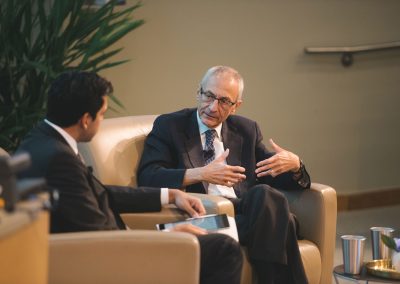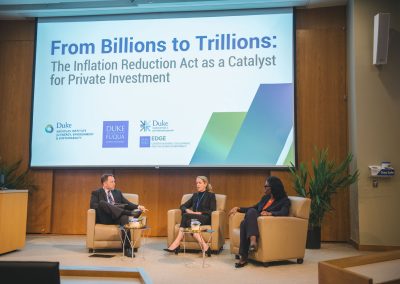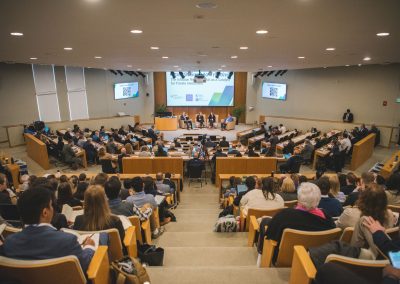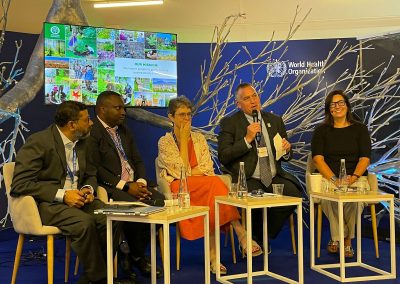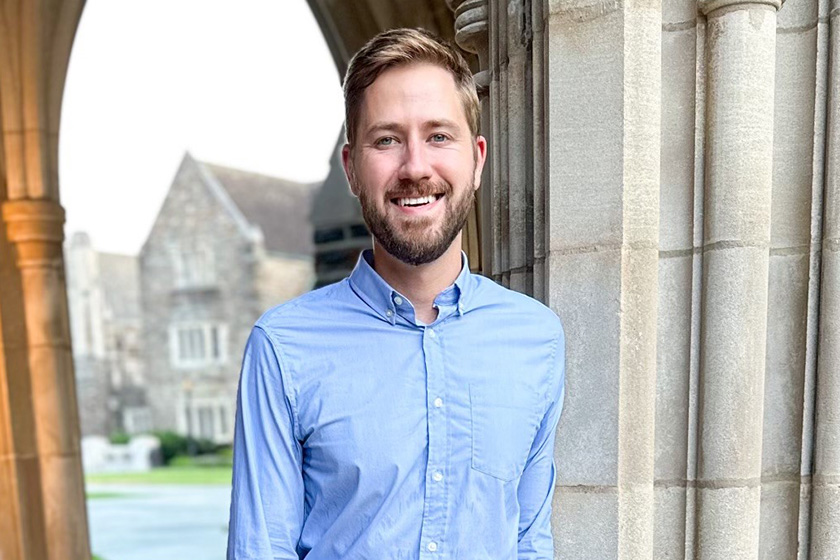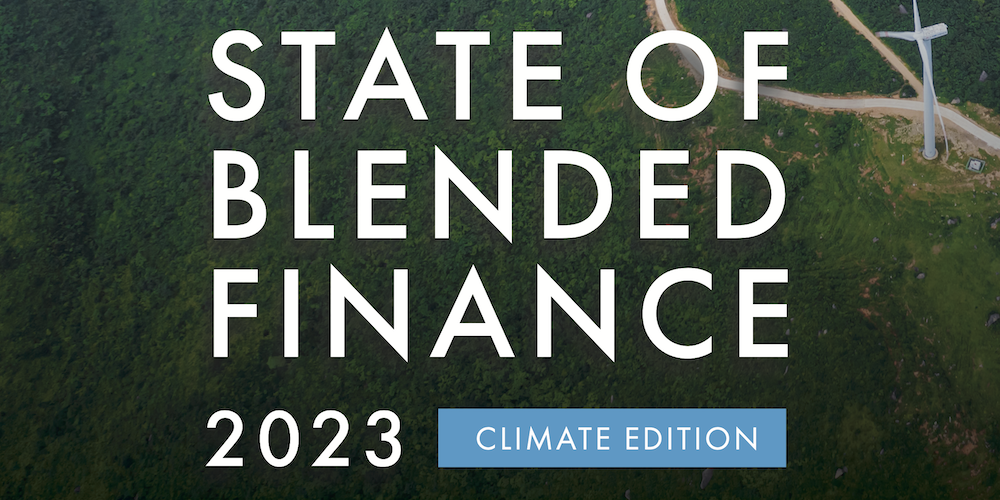Climate Finance and Policy
Decarbonizing the global economy and securing a more resilient future will require policy alignment, governmental and philanthropic investment, and the mobilization of private capital for scale. Find out how Nicholas Institute experts are contributing to cross-sectoral dialogue and action.
Highlight
Energy Pathways USA Illuminates Obstacles, Opportunities for US Energy Transition
The Energy Pathways USA project at the Nicholas Institutes brings public- and private-sector partners together to craft workable solutions that accelerate a net-zero carbon future.
Modeling Effects of the Inflation Reduction Act (IRA) and More
A December 2023 report from Energy Pathways USA modeled the intersecting effects of the IRA, clean electricity development cost increases, and the impacts of proposed US Environmental Protection Agency greenhouse gas regulations for fossil fuels in the power sector.
Read about the report’s top-line findings →
Strengthening Supply Chains for US Decarbonization
The batteries, solar panels, wind turbines, and electrical grid upgrades that will power the energy transition all require access to massive amounts of raw materials. An Energy Pathways USA policy brief focuses on strengthening US supply chains for these key materials, recommending ways to accelerate development of domestic supply chains while maintaining ambitious decarbonization efforts.
EPA Power Sector Regulations
In May 2024, Nicholas Institute expert Tim Profeta led a briefing on the US Environmental Protection Agency (EPA)’s newly released standards for existing coal and new gas-fired power plants and outlined the key implications and questions for US decarbonization. Profeta formerly served as special counsel for the power sector and senior advisor at the EPA.
Permitting for the US Energy Transition
The United States’ clean energy transition calls for formidable infrastructure shifts—but the processes for permitting low-carbon energy generation and transmission are complex and time-consuming. US Rep. Scott Peters (D-CA) discussed how to advance this transition via permitting reforms at Duke in DC in a July 2023 conversation with Nicholas Institute director Brian Murray.
The Inflation Reduction Act has the potential to be the most impactful piece of federal climate legislation in our country’s history.
Making the Leap from ‘Billions to Trillions’
While Congress has committed hundreds of billions of dollars to advance decarbonization in the United States, trillions more in private investment are needed for the country to reach its climate goals. The Nicholas Institute and the Fuqua School of Business convened a day-long summit in February to create a shared vision for unleashing private capital for climate solutions. The summit featured an all-star lineup of public officials and business leaders in conversation with Duke faculty.
These opportunities are vital mechanisms for bridging Duke’s world-class experts and federal decision-makers to advance durable and equitable climate and sustainability solutions.
Leadership Exchange
Nicholas Institute Experts Advance Climate and Sustainability Solutions Within Federal Government
Martin Doyle, Lydia Olander, and Tim Profeta discuss recent temporary assignments with the Office of the Assistant Secretary of the U.S. Army for Civil Works, White House Council on Environmental Quality, and U.S. Environmental Protection Agency.
Highlight
New Initiative Seeks to Unlock Climate Resilience Funding
Investments intended to build the resilience of climate-vulnerable communities are falling well short of global targets. To help close this finance gap, the Resilience Monetization and Credit Initiative is developing innovative methods—such as “resilience credits”—to measure and monetize adaptation and resilience benefits. The initiative is a collaboration of the James E. Rogers Energy Access Project at Duke, the International Fund for Agricultural Development, and the Egyptian Ministry of International Cooperation.
Innovative approaches are clearly needed to stimulate investments in climate adaptation and resilience from both the private sector and the households that can benefit from these measures.
Jonathan Phillips, director of the James E. Rogers Energy Access Project, was a visiting associate professor at Duke Kunshan University (DKU) in China during the fall 2023 semester. His research and teaching at DKU focused on international climate finance, rural electrification, off-grid energy systems, and energy for productivity in developing countries.
Marc Jeuland, faculty director of the James E. Rogers Energy Access Project, spent the 2023-2024 school year as a Fulbright Fellow at the University of Cape Town (UCT) in South Africa. Jeuland taught UCT students about applied quantitative social science methods needed to address limited electricity access and worked to build a collaborative research program for measuring and improving energy-based value chains. He also lay the groundwork for Climate+ and Bass Connections teams focused on the role of clean energy during South Africa’s energy crisis.
Leadership Exchange
Sharing Expertise to Develop Solutions for Emerging Economies
Alix Peterson Zwane
Executive in Residence
“Collectively, we have a shared interest in rapid, inclusive growth in developing countries. This is a moral imperative, and it’s also practical.
From a climate perspective, for developing countries, the best adaptation strategy is economic growth and development.”
Alix Peterson Zwane joined the Nicholas Institute in April as the inaugural executive in residence with the James E. Rogers Energy Access Project. Her work at Duke focuses on accelerating models for low-carbon development in low- and middle-income countries.
Zwane comes to Duke with two decades of experience advancing evidence-based aid and international development at a range of institutions, including Evidence Action, the Bill & Melinda Gates Foundation, Google.org, Yale University, and the University of California, Berkeley. Most recently, she served for more than eight years as the first CEO of the Global Investment Fund, a hybrid investment vehicle based in London.
Duke Experts and Students Engage in COP28
Ashley Ward and Jackson Ewing took part in the 2023 UN Climate Change Conference (COP28) in Dubai, United Arab Emirates. They were joined by a group of 18 students from Duke’s unique UN Climate Change Negotiations Practicum, in which students learn about international climate policy before attending the negotiations. Ewing, who leads the course, also facilitated private roundtables on climate finance. Ward moderated a WHO Health Pavilion event about building resiliency in the face of extreme heat. Marc Jeuland presented virtually on the James E. Rogers Energy Access Project’s recent climate finance work. Meanwhile, new Nicholas Institute publications and projects were highlighted by partners at several COP28 events.
Education Spotlight
Student Profile: Tyler Norris
Tyler Norris had more than a decade of experience in the energy sector when he entered a Ph.D. program at the Nicholas School of the Environment in 2023. Shortly arriving on campus, Norris drew attention in national energy policy circles for a Nicholas Institute policy brief exploring how the United States could more quickly connect renewable energy sources to the power grid. He has continued to research grid interconnection with the Nicholas School’s GRACE Lab while working closely with the Nicholas Institute on related policy.
“The Nicholas Institute has a well-deserved reputation in the energy sector for conducting actionable, non-partisan research and analysis to address critical challenges that we face with the energy transition,” said Norris, who has been awarded a highly selective James B. Duke Fellowship, designed to attract and develop outstanding scholars at Duke. “The opportunity to collaborate with the institute’s experts to craft viable policy solutions was an important factor in my decision to pursue my doctorate at Duke.”
More in Climate Finance and Policy
Conducting Climate Diplomacy in China
Nicholas Institute experts traveled with a Duke delegation to China in November 2023 to meet with university partners and engage in educational and research climate diplomacy. The delegation also participated in the 2023 Duke International Forum at Duke Kunshan University.
Working with States to Deploy Federal Funding
The Conveners Network established the States Deployment Initiative to help states fully capture the benefits of the Environmental Protection Agency’s Climate Pollution Reduction Grants Program. The Nicholas Institute, an original partner in the network, is helping to facilitate the initiative.
Analyzing the State of Climate Blended Finance
Blended finance combines public and private funds to finance sustainable development projects. For Convergence, Nicholas Institute experts offered insights on country-level platforms in climate blended finance, key areas where blended finance can contribute, and the role climate blended finance can play in driving private investments at scale.



